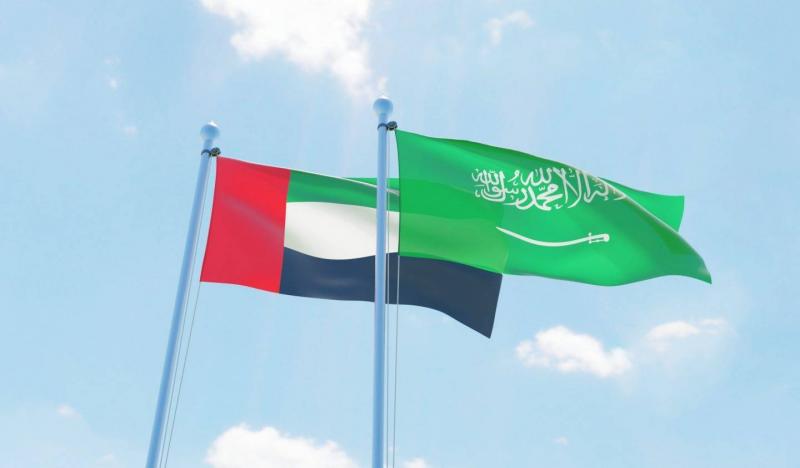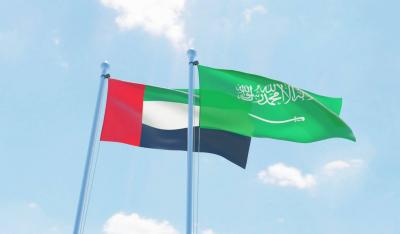The United Arab Emirates and the Kingdom of Saudi Arabia confirmed their efforts to enhance strategic cooperation and economic, commercial, and developmental integration to build a better future that achieves security, prosperity, and comprehensive development, fulfilling the aspirations of their peoples. This commitment is within the framework of the distinguished brotherly relations and the strong historical ties that unite the two countries and their peoples.
In a joint statement issued today, both countries emphasized continued coordination on issues of mutual interest in both regional and international arenas to serve their interests and enhance security and stability in the region and the world. Below is the text of the joint statement issued by the United Arab Emirates and the Kingdom of Saudi Arabia on the occasion of His Royal Highness Prince Mohammed bin Salman bin Abdulaziz Al Saud's visit to the UAE:
"In the context of the distinguished brotherly relations and the strong historical ties between the leaderships of the Kingdom of Saudi Arabia and the United Arab Emirates and their peoples, and in pursuit of enhancing and developing strategic cooperation and economic, commercial, and developmental integration towards building a better future that achieves security, prosperity, and comprehensive development for the aspirations of the people of the two brotherly countries, and based on the directives of the Custodian of the Two Holy Mosques, King Salman bin Abdulaziz Al Saud – may Allah protect him – His Royal Highness Prince Mohammed bin Salman bin Abdulaziz Al Saud, Crown Prince, Deputy Prime Minister, and Minister of Defense of the Kingdom of Saudi Arabia, visited the United Arab Emirates on Tuesday and Wednesday, December 7-8, 2021.
During the visit, talks were held between His Royal Highness Prince Mohammed bin Salman bin Abdulaziz Al Saud and his brother His Highness Sheikh Mohammed bin Zayed Al Nahyan, Crown Prince of Abu Dhabi and Deputy Supreme Commander of the Armed Forces. During these talks, Prince Mohammed bin Salman congratulated the leadership, government, and people of the United Arab Emirates on the occasion of the Golden Jubilee of the Union, praising the accomplishments of the UAE in various fields, and wishing the UAE further progress, welfare, prosperity, security, and stability under its wise leadership.
The visit also reviewed the dimensions of the brotherly relations between the two countries, the ongoing strategic cooperation, and means to enhance and develop their relations further into broader horizons across various fields. The two sides praised the distinguished level of cooperation between them in political, security, military, economic, and developmental sectors and what has been achieved through collaboration under the umbrella of the Saudi-Emirati Coordination Council, which was established under the generous guidance of the Custodian of the Two Holy Mosques King Salman bin Abdulaziz Al Saud and his brother His Highness Sheikh Khalifa bin Zayed Al Nahyan, President of the State – may Allah protect them. They reaffirmed their intention to enhance and develop the Council's role in the coming phase across all fields to serve their strategic interests in embodiment of the wise vision of the leaderships of the two countries aimed at strengthening the ties of brotherhood, cooperation, and partnership between their peoples.
Both sides noted the abundant economic possibilities and outstanding opportunities to enhance strategic partnership and increase bilateral investments, emphasizing the importance of showcasing promising areas for investors in both countries.
In the field of energy, both parties noted their close cooperation and the successful efforts of OPEC Plus countries aimed at enhancing stability in the global oil market, while affirming the importance of continued cooperation and the necessity for all participating countries to abide by the OPEC Plus agreement. They also highlighted the significance of exploring cooperation in mutual opportunities in the fields of oil and gas, petrochemicals, as well as cooperation in the peaceful uses of nuclear energy, enhancing cooperation in the trade of petroleum products, benefiting from electrical interconnections and energy trading, artificial intelligence, digital transformation, cybersecurity, and advanced industry and technology.
In addressing climate change, both parties welcomed the enhancement of cooperation regarding the application of the circular carbon economy approach initiated by the Kingdom during its presidency of the G20, which was approved by the group as a comprehensive framework for addressing and managing challenges arising from greenhouse gas emissions through available and innovative technologies, representing an economically sustainable way to manage emissions. The Emirati side highlighted the comprehensive local, regional, and global benefits of the Green Middle East Initiative launched by His Royal Highness Prince Mohammed bin Salman bin Abdulaziz Al Saud to combat climate change. They also praised the pioneering role of the UAE in climate action, including hosting the 2023 COP28 climate conference, which aims to intensify international efforts to address and manage the impacts of climate change through state-of-the-art technologies to separate, reuse, and geologically store carbon, and through natural mediums to absorb it within ecosystems.
The two parties confirmed the importance of enhancing cooperation in various sectors, including health, tourism, food security, and human development, especially in the fields of youth and women's empowerment. His Royal Highness Prince Mohammed bin Salman bin Abdulaziz Al Saud congratulated the UAE for its successful hosting of Expo 2020 Dubai, while His Highness Sheikh Mohammed bin Zayed Al Nahyan indicated the UAE's support for Saudi Arabia in hosting Expo 2030.
Both sides affirmed their commitment to the contents of the Al-Ula Declaration issued on January 5, 2021, which called for the full and precise implementation of the vision of the Custodian of the Two Holy Mosques King Salman bin Abdulaziz Al Saud, approved by the Supreme Council during its 36th session in December 2015, according to a specified timetable and precise follow-up. This includes completing the components of economic unity, building a shared defense and security framework, and coordinating stances to enhance the solidarity and stability of the Gulf Cooperation Council countries, reinforcing their regional role through unified political stances and developing political partnerships with the international community and regional and international organizations to strengthen and solidify the Council's unity and the unity of its members.
The two sides reviewed the developments and issues of mutual concern in regional and international arenas, emphasizing coordinating their positions to serve their interests and support and enhance security and stability in the region and the world. In this regard, both parties confirmed their full support for all the legitimate rights of the Palestinian people, foremost among which is their right to establish an independent and sovereign Palestinian state along the June 4, 1967 borders, with East Jerusalem as its capital, in accordance with the Arab Peace Initiative, relevant Security Council resolutions, the Madrid Conference references, and other internationally agreed references, fulfilling the aspirations of the brotherly Palestinian people.
On the Yemen issue, both sides affirmed their agreement on continuing efforts to find a comprehensive political solution to the Yemeni crisis in accordance with the references embodied in the Gulf Initiative and its executive mechanism, the outcomes of the Comprehensive National Dialogue Conference, Security Council Resolution 2216, and the Kingdom of Saudi Arabia’s initiative to end the Yemeni crisis, ensuring respect for Yemen's unity, integrity, and sovereignty, and rejecting any interference in its internal affairs, while emphasizing the necessity of completing the implementation of the Riyadh Agreement. They condemned the continued targeting of airports and vital facilities in the Kingdom by Houthi terrorist militias.
On the Lebanese issue, the two sides emphasized the necessity of implementing comprehensive political and economic reforms to ensure Lebanon overcomes its crises, restricting arms to legitimate state institutions and ensuring that Lebanon does not become a launchpad for terrorist acts and a haven for organizations that threaten the security and stability of the region, such as the terrorist Hezbollah, and preventing it from being a source of the drug menace threatening the safety of communities in the region and the world.
Both parties welcomed the success of the electoral process in Iraq and expressed their wishes for the formation of an Iraqi government that can continue working towards the security, stability, and development of Iraq, combating terrorism, and halting external interference in its internal affairs. They also welcomed the understandings reached by the transitional parties in Sudan and reinforced their continued support for all efforts aimed at achieving security and stability in Sudan, extending their wishes for stability and prosperity for Sudan and its brotherly people.
The two sides reiterated the importance of addressing Iran’s nuclear and missile file seriously and effectively, contributing to achieving regional and international security and stability, reaffirming the principles of good neighborliness, respecting international resolutions and legitimacy, and keeping the region free of destabilizing activities and interventions. They called on the relevant parties to consider the interests of the region's countries and their security and stability.
Both sides affirmed that a political solution is the only remedy for the Syrian crisis, supporting, in this regard, the efforts of the United Nations and its Special Envoy to implement relevant international decisions, primarily Security Council Resolution 2254, and stopping regional interventions and projects that threaten Syria’s unity, sovereignty, and territorial integrity, while standing in solidarity with the Syrian people and affirming the necessity of supporting international humanitarian efforts in Syria.
Regarding Afghanistan, both sides stressed the need to support security and stability in Afghanistan and to prevent safe havens for terrorists and extremists there. They condemned any acts targeting the recruitment of Afghan refugees in various conflict zones and expressed the importance of supporting relief and humanitarian efforts in Afghanistan. In this context, the Emirati side praised the Kingdom’s call for a special ministerial meeting for OIC countries to discuss the situation in Afghanistan to be held in the Islamic Republic of Pakistan on December 19, 2021, while the Saudi side commended the UAE’s efforts in the evacuation operations from Afghanistan.
On the Libyan issue, both sides welcomed the Libyan and international efforts to support the implementation of the agreed political entitlements, advocating for the enabling of the Libyan brotherly people to achieve their aspirations for unity, peace, and stability, while emphasizing the necessity of withdrawing mercenaries, foreign fighters, and foreign forces from Libya.
At the conclusion of the visit, His Royal Highness Prince Mohammed bin Salman bin Abdulaziz Al Saud expressed his gratitude and appreciation to his brother His Highness Sheikh Mohammed bin Zayed Al Nahyan for the warm reception and generous hospitality extended to him and his accompanying delegation.
His Highness Sheikh Mohammed bin Zayed Al Nahyan, in turn, conveyed his best wishes to his brother His Royal Highness Prince Mohammed bin Salman bin Abdulaziz Al Saud and to the brotherly Kingdom of Saudi Arabia for continued success and prosperity under its wise leadership.




